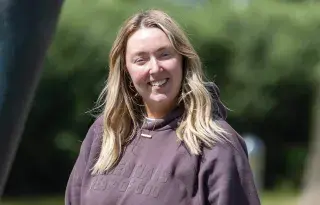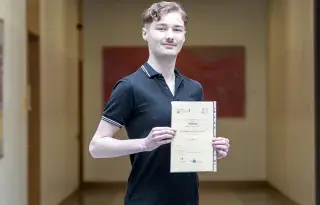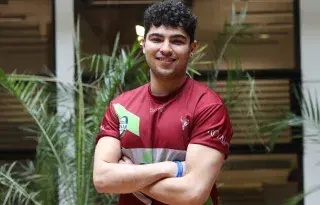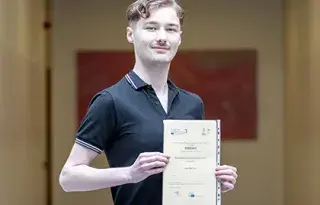BA (Hons) in Arts
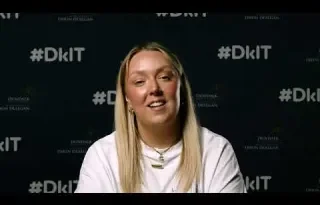
Search to find a different course
Course Overview
This course offers a multifaceted exploration of the human experience through various Arts disciplines. It provides students with a rich foundation in subjects such as history, archaeology, politics, literature and drama while fostering critical thinking, creativity, and cultural appreciation. Through the study of historical contexts, cultural and social theories, and practical skills, students develop a deep understanding of humanity. It cultivates analytical and communication skills, enabling graduates to articulate complex ideas, interpret diverse perspectives, and contribute to the ever-evolving social and cultural landscape.
An academic Arts degree not only nurtures individual growth but also prepares students for a wide range of careers in fields such as education, media, politics, arts administration, and creative industries. This course offers a traditional arts education in History, English, Archaeology, Politics and Society, alongside three-years of digital humanities training, and is designed in line with Teaching Council requirements.
What makes this course different
High Student Satisfaction
This course has a high satisfaction rating with 93% of graduates very likely or likely to do same course if choosing again (DkIT/HEA Graduate Survey)
Employment Opportunities
90% of graduates from this degree are in employment or further study after 6 months of graduating. (DkIT/HEA Graduate Survey)
Pathway to Teaching
The programme is designed in line with Teaching Council requirements for the subjects of History, English and Politics & Society. Each year 60% of our Arts graduates continue to further education, with the majority aiming to become teachers.
Students who complete the BA (Hons) in Arts gain a significant range of transferable skills, including critical thinking and research, which enable to complete further studies, and work, in a diverse range of areas and sectors.
Understanding the Industry
Our curiosity about language, histories and global cultures drives our insight and learning. People broaden their horizons by exploring the ways in which the humanities and social sciences help us to think imaginatively and critically about the worlds we live in. It is important to note that an academic Arts degree provides a broad skill set that can be applied in diverse industries. Graduates often possess transferable skills such as creativity, critical thinking, problem-solving, communication, and adaptability, making them valuable assets in many professional settings.
Career Opportunities
Future Careers:
- Primary and Secondary Teaching
- Adult Education
- Arts and Heritage Administration
- Journalism
- Librarianship
- Archivist
- Civil Service
Course Delivery and Modules
- Introduction to Digital Humanities: Digital Literacy
- Ireland 1800-1921: Success and Failure under the Union
- Prehistoric Ireland: From First Settlers to the Bronze Age
- Irish Literature
- Introduction to Social and Political Thought
- Introduction to Multimedia for Humanities
- History
- History and Historians
- Ireland 1921-98: Modernity and Tradition
- Europe 1918-2007: The Breaking of Nations
- Archaeology
- English
- Literature and Society: Cultural Texts and the Transmission of Ideology
- Borders in Literature: The Poetry and Fiction of Liminality
- Introduction to Cultural Theory
- Politics & Society
- Ireland, 1540-1800: Land and Religion
- The Rise of the USA: Civil War to Cold War
- History of the European Revolutionary Tradition 1879-1921
- Early Modern Europe, 1450-1700
- Ireland 1912-1932: Revolution and Counter-Revolution
- Irish Protestant Traditions
- The Archaeology of Medieval Ireland
- Prehistoric Europe: Ice Age to Bronze Age
- Celtic Ireland and Europe
- The Archaeology of Britain
- Digital Humanities Research Project
- The Rise of the Atlantic World, 1400-1800
- Medieval Ireland
- Great Britain and Britishness since 1945
- European Imperialism, 1870-1970
- Tolerance and Intolerance in Reformation Europe
- The European City
- Archaeological Theory
- The Archaeology of Death and Burial
- Archaeology of the Recent Past
- Heritage Management and Entrepreneurship
Education Progression
Students who complete the course can apply to a Postgraduate Master in Professional Education. The course is designed in line with Teaching Council requirements for the subject areas of History, English, Politics & Society.
On completion of their undergraduate studies, graduates with a 2:1 award class can apply for Masters and PhD by Research.
Fees and Funding
Please find information on fees and funding here: www.dkit.ie/fees
Entry requirements
In addition to the standard entry requirements below, English Grade 02 or H5 is also required. Applicants from NI/UK require a GCSE English Grade A or AS Level Grade C or A Level Grade D.
Please note there is no Maths entry requirement for this course.
- Standard Requirements for Leaving Certificate Applicants
- Standard Requirements for UK/NI Applicants
- Standard Requirements for QQI-Further Education Applicants
Recent CAO points
How to apply
Apply on CAO
All standard entry first-year applicants must apply for entry through the CAO. See Important application dates for CAO and information for specific applicant types below:
Advanced Entry & Transfer Applications
Advanced Entry is for applicants who have previous educational achievements and/or work experience and want to be considered for direct entry into year 2, 3, or 4 of a course. This includes students looking to transfer to DkIT from another Higher Education provider.
International Application (non-EU)
International Applicants (not from or living in the EU) can apply through an agent or directly to DkIT to study this course.
Ask us a Question
If you have a question about the BA (Hons) in Arts please ask it below and we will get back to you.
Disclaimer: All module titles are subject to change and for indicative purposes only. All courses are delivered subject to demand and timetables are subject to change. Elective Module options will only run subject to student numbers. The relevant Department will determine the viability of each elective module option proceeding depending on the number of students who choose that option. Students will be offered alternative elective modules on their programme should their preferred elective option not be proceeding. Award Options for Common Entry Programmes: The relevant Department will determine the viability of each award option proceeding depending on the number of students who choose either option. If the numbers for one of the Award options exceed available places, students for this option will be selected based on Academic Merit (highest grades).
